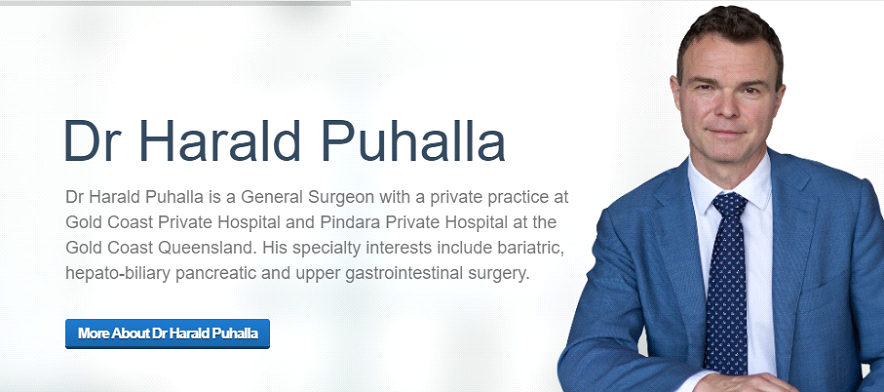Gastric Sleeve Can Help You Change Your Life
Gastric sleeve works on a simple principle: that you will eat less and a small amount of food made you feel full. By reducing the size of the stomach, after a Sleeve Gastrectomy people feel full very quickly. Gastric sleeve is one type of bariatric surgery. A consultation with Dr Puhalla, Bariatric Surgeon, can help you determine whether you’re a candidate and which type of surgery will work best for you.
What You Can Expect from Dr Harald Puhalla Regarding Gastric Sleeve Surgery
Dr Puhalla, Bariatric Surgeon, began his surgical training in 1995 with a focus on general surgery and specialising in weight-loss surgery. He is based at the Gold Coast Private Hospital and Pindara Private Hospital. Here are some of the things you can expect when Dr Puhalla performs your procedure.
- Minimally-invasive surgery. Dr Puhalla uses the keyhole technique for a minimally-invasive procedure. This approach requires smaller incisions, less downtime, and a lower risk of complications.
- Experience. Dr Puhalla has over 20 years of surgical experience and continues his education on an ongoing basis, staying current on the latest techniques and research.
- A range of options. Dr Puhalla offers many types of weight-loss and general surgeries, including sleeve gastrectomy, mini gastric bypass, Roux-en-Y gastric bypass, and surgical treatments for a range of health conditions.
- Ongoing care. Dr Puhalla cares deeply for his patients and provides long-term care after your procedure to ensure that you are healing properly and enjoying optimal results.
Benefits of Gold Coast Gastric Sleeve on the Gold Coast
Many people who need to lose a significant amount of weight have tried multiple times diet and exercise programs without achieving satisfactory long-term success. You may have had some success at first, only to find that the weight returns in time – usually, in less than a year after losing it. It’s important to keep the weight off long-term to reap the health benefits of maintaining a healthy weight. Here are some of the benefits of sustained weight loss through surgery.
- Improved heart health. Weight-loss surgery can reduce your risk of heart disease and stroke and help cholesterol and blood pressure levels return to normal, improving your overall well-being.
- Remission for type-2 diabetes. Frequently type-2 diabetes goes into remission after weight- loss surgery. Many patients remain free from insulin and other diabetes medications for several years after surgery.
- Relief from joint pain. Carrying excess weight around puts a great deal of stress on the joints, leading to joint damage and chronic pain. Significant weight loss can relieve this stress and improve the patient’s mobility. Read more (Sjostrom L et al , 2004 NEJM).
- Better emotional health. If you are obese, you may feel depressed because of social stigma and poor body image. It may also be challenging to participate in activities you enjoy. Losing excess weight can improve mental health in these individuals. Read more (Sjostrom L et al , 2004 NEJM).
What You Should Know About Failed Sleeve Gastrectomy
There are cases in which the patient is unable to lose substantial weight after a sleeve gastrectomy. This situation is known as a failed sleeve. Here are some things you should know:
- Most patients enjoy excellent results after a gastric sleeve procedure. However in the long- term the sleeve can stretch which leads to increasing portion sizes and especially in combination with poor food choices can lead to substantial weight gain.
- Heartburn is seen after sleeve gastrectomy and can be disturbing. You may consider a revisional procedure into a gastric bypass to substantially improve your reflux symptoms
- Your sleeve may be able to convert to a gastric bypass. If you are unable to lose weight after a gastric sleeve, you may see better results with a gastric bypass or SADI-S. While a gastric sleeve is restrictive only, gastric bypass and SADI-S has the added benefit of malabsorptive results.
- Slowing weight loss is not a sign that your procedure has failed. It’s normal for weight loss to be rapid at first and then slow and at some stage the weight stays stable and after years a gentle weight gain can be observed.
About Dr Puhalla, Bariatric Surgeon
Weight-loss surgery can help you get on track to leading a healthy, fit life. We are passionate about supporting and caring for our patients as they work toward a positive long-term outcome. If you have questions about surgery, such as whether you are a candidate or gastric sleeve cost in the Gold Coast, contact Dr Puhalla today
Implications of Bariatric Surgery
- After an SAGB, RYGB and Loop DS the anatomy has been changed due to the transection of the proximal stomach to create the pouch. Therefore the first part of the small bowel cannot be entered with an endoscope (gastroscopy). In case of stones in the bile duct a standard endoscopy (ERCP) is not possible to retrieve the stones, so if necessary the bile duct may be operated on by using minimal invasive keyhole techniques.
- Smoking should be quit in a timely manner before any weight loss operation. Smoking can promote inflammation of the stomach, which can lead up to a gastric perforation. Therefore, smoking especially after an SAGB and RYGB should be avoided.
- Sometimes loose bowel motions are possible and may require oral medication. Also reported are changes of the taste and food intolerances and some temporary hair loss.
- Especially after Sleeve Gastrectomy, SAGB, RYGB or SADI-S / SIPS deficiencies particularly of iron, protein, calcium, micronutrients and Vitamin B12 are possible. Therefore regular blood tests to check for any vitamin- or nutritional deficiencies are detected early. In most patients these deficiencies are easily preventable by following the diet recommendations and taking daily multivitamin tablets.
- The safe use of oral contraception (birth control pills) cannot be guaranteed due to the altered drug absorption from the gastrointestinal tract after all types of bariatric surgery. Pregnancy should be avoided within 24 months after bariatric surgery due to the ongoing weight loss. For all female patients of childbearing age a contraceptive hormone injection is suggested.
- Weight regain can occur after all types of bariatric surgery. It is seen more frequently after Sleeve Gastrectomy than after Single Anastomosis Gastric Bypass, Roux – en – Y Gastric Bypass or SADI-D / SIPS (Loop DS). If over the time an increasing volume of food is consumed the gastric pouch can slowly dilate. The meal sizes will increase and the procedure loses its effect and weight will be gained. Regular attention to weight gain and a responds (e.g. contact dietitian) is necessary.
- Postoperative follow up after all bariatric operations: In the first year after the operation regular medical check-ups should be done every 3 months, in the second year every 6 month, after that annually. The daily intake of a multi vitamin tablet to prevent vitamin or micronutrients deficiencies is strongly recommended. Furthermore, in order to prevent osteoporosis (bone weakness) you will need a calcium-rich diet.
- ⦁ Specifically after any bypass procedure the intake of sweets or high-calorie beverages should be avoided since it can cause discomfort (Dumping).

